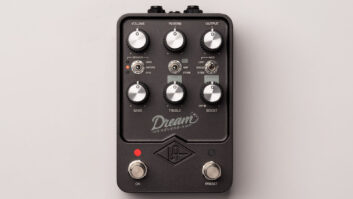In 1942, while training with the Air Force, Harold Burroughs Rhodes created a laptop keyboard from scrap plane materials he found around the airfield. His intention for this keyboard, now known as the Army Air Corps Piano or Xylette, was to create a smaller, more portable piano to use while teaching injured soldiers during WWII to play as a form of musical therapy, but the invention would carry on to become one of the most revolutionary instruments in the music industry. Now that story has been captured in the sumptuous Book and Blu-ray set, Down The Rhodes: The Fender Rhodes Story.

Authors Gerald McCauley and Benjamin Bove chronicled the Rhodes keyboard, and how it influenced countless artists in the music industry through this oversized hardcover book and accompanying 2013 documentary. Published by Hal Leonard Books, the book features intimate interviews with dozens of music’s notables on their experiences with the instrument, and takes a look at how the Fender Rhodes played a role in creating music from the 1960s on.
Authors Gerald McCauley (left) and Benjamin Bove

Between 1946 and 1965, Rhodes would continue to improve on this piano, eventually creating the well-known 32-note Fender Rhodes Keyboard Bass, which has been used many of music’s most memorable artists, including Miles Davis, Quincy Jones and Herbie Hancock.
In the section titled ‘In The Making,’ engineer Steve Woodyard discusses his involvement in the development of future generations of the keyboard. “One benefit I got from all those years was that, because I worked with so many of our sponsored artists, I developed a sense of touch that was very articulate. I also had to develop an ear to hear and feel all the nuances per note—not just a group of notes, but all the way per note…I didn’t realize until later, but that’s what allowed me to develop the Mark V…and the Mark IV,” Woodyard said in his interview for the book.
The bulk of the book is a testament to the Fender Rhodes’ impact on music, complete with color photos. “When you’re talking about the Rhodes piano, you cannot forget Herbie Hancock and “Chameleon” (of the funk-jazz fusion classic from the 1973 album, Headhunters.) The sound of the Rhodes on that track is what a lot of people strive for in their Rhodes piano sound. It set the standard for a lot of people today,” said Bove.
Down The Rhodes: The Fender Rhodes Story is a great collector’s item for the keyboardist, musician or music collector. A special limited edition of the book comes in a leather case.
Down The Rhodes on Amazon
http://amzn.to/18WYVeK
Hal Leonard Books
www.halleonard.com







